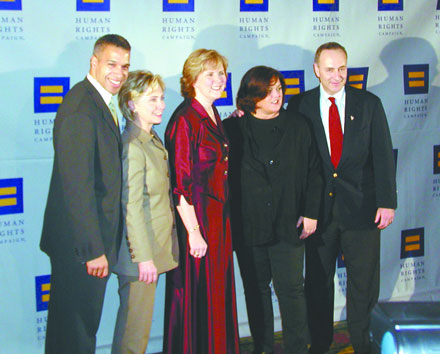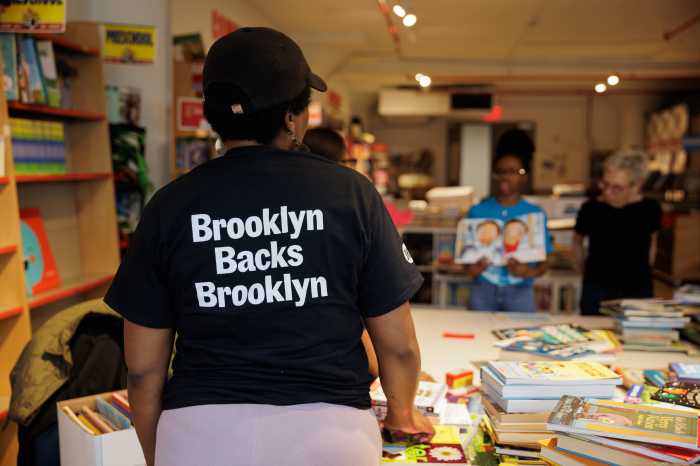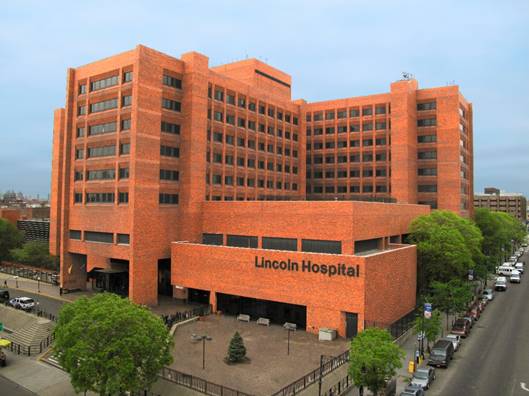Hillary Clinton talks about the Constitution while HRC presses the case for marriage
The Human Rights Campaign’s (HRC) annual gala dinner blended a celebration of progress with the immediacy of a crisis at the Waldorf-Astoria Hotel’s grand ballroom this past Saturday.
New York Sen. Hillary Rodham Clinton gave the keynote address and called the election of 2004 the most important in the history of the nation. Clinton criticized Pres. George W. Bush for promoting an amendment to change the Constitution to deny same-sex couples the right to marry, but she did not mention the recent Massachusetts Supreme Court ruling that gives same-sex couples that right.
In contrast, HRC executive director Cheryl Jacques compared the court decision to allow same-sex marriages to the civil rights movement of the 1960s and said that it was the first time that same-sex couples were considered equal under the law.
“That decision is here and we have been told that we are equal,” she said. “And there is absolutely no retreating from this time. We cannot retreat.”
Jacques pressed the cause of gay marriage, saying civil unions are not identical to marriage because marriage carries with it hundreds of years of law and acceptance.
“As the Supreme Court said, separate and not equal sets up a second class of citizens and we will not be second class citizens,” she said.
Jacques continued, emphasizing the advantages of marriage over civil unions.
“If we are equal under marriage laws, then it is difficult for an employer to say, ‘I won’t treat you equal.’ Marriage is tied to everything we have been working on,” she said.
Clinton does not support same-sex marriage, but she does support civil unions and other measures aimed at equal protection under the law. But in her speech, it was clear that she sees the battle against the Federal Marriage Amendment, introduced into Congress last year and expected to be endorsed explicitly by the president soon, as a partisan rallying cry in the lesbian, gay, bisexual, and transgender (LGBT) community.
“This is about the Constitution of these United States and the underlying belief that through our efforts as a nation, we have constantly expanded the circle of opportunity and rights to all,” Clinton said. “So this cannot be seen as just an issue for the LGBT community. This is an American issue and Americans must stand against this terrible effort to undermine and change our Constitution.”
Her criticism of the Bush administration was not limited to the constitutional amendment question. Clinton admitted that she took it a bit personally when, as a new senator, she realized the intentions of the Bush administration and the Republican leadership in the Congress.
“I understood that this administration was not just committed to rolling the clock back on what Bill Clinton had done,” she said. “It intended to roll the clock back insofar as possible on the progress on the 20th century. There was a conscious effort to undermine the bipartisan consensus that had developed over time on behalf of a social safety net, a civil rights agenda, international leadership on specific issues large and small, ideology trumps evidence.”
In a touching anecdote about how her father, who she said had “every prejudice that a white, Anglo-Saxon, Protestant, American could have,” Clinton told how he became aware that his good friends and neighbors were gay. She used this story to remind the politically minded that not every step forward in the gay rights movement will take place in a courthouse or on the floor of the Congress, but sometimes it happens with “those small acts that happen close to home, around the dinner table or in a kitchen, or with a neighbor.”
Senator Charles Schumer, New York’s senior senator, spoke briefly, reiterating one of his common themes––the need for vigilance against Bush administration efforts to appoint far rights jurists to the federal judiciary. Schumer has been a leader on several high profile filibusters that have sunk Bush appointments.
The black-tie affair was complete with tuxedos, sparkling gowns, fine dining, plenty of political chatter, and awards of recognition. The Speaker of the New York City Council, Gifford Miller, presented J.P. Morgan Chase the Corporate Equality Award, calling the global financial services firm a leader in its support of the LGBT community. The Hetrick-Martin Institute received the Community Equality Award for its commitment to serving LGBT youth for 25 years and for its special focus on the Harvey Milk High School, which came under considerable political and media fire in the past six months. David Mensah, Hetrick-Martin’s leader, spoke movingly about why the Harvey Milk High School is necessary.
Finally, Judy Weider, senior vice president and corporate editorial director of LPI media, which publishes The Advocate, Out, and Out Traveler magazines, received the Equality Award and was introduced by entertainer and activist, Rosie O’Donnell.
When O’Donnell took the stage, she gave a boisterous and rambunctious speech covering everything from Janet Jackson’s Superbowl breast flap to her recent lawsuit where she said she was “condemned for being fat, loud, gay, a yeller, and a woman.” She then asked all the “rich boys” in attendance to go down to Martha Stewart’s trial to support her.
“My little Martha is going to go down on a $40,000 sale? Eat me. Get off your butts and go to Martha Stewart’s,” she said. “I’m back, I’m gay, nobody’s suing me, I don’t give a shit anymore.”
The stand-up ended when O’Donnell spoke seriously about her lawsuit, making a strong and personal point about equal civil marriage rights.
“Because I am gay and not legally married to my spouse of six years, they were privy to all our private emails,” she said. “Because heterosexual people who are married have something called spousal privilege… any and everything I said to my wife, legitimate in court. Including the name of the person who abused me when I was a kid.”
Without stepping up to support the right to marry and the recognition and benefits that come with it, Clinton’s speech still conveyed a sense of historical importance surrounding what could become a perfect storm in the gay rights movement when the legal gains in Massachusetts, the proposed tinkering with constitutions in Washington and Boston, and the presidential election all come together this year.
“This is a moment in time which we will look back on and we be asking ourselves and we will be asked what did we do try to get our country back on track,” she said. “This year is the most critical election in American history. And let’s go out and make sure it turns out the right way.”



































